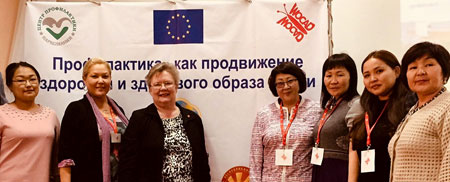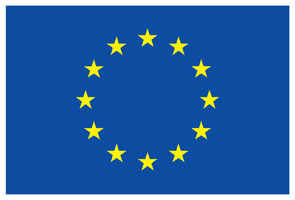Seminars in regions

Within the framework of the project “Exploiting the potentialities of CSOs and LAs for development of holistic prevention of drug and alcohol abuse among girls and women in lagging regions of Russia” the seminars on gender-specific prevention have been held in four regions of the Russian Federation.
On May 20 - 21, 2019 in Ulan-Ude (conference hall of the Baikal Plaza hotel) and on May 23-24, 2019 in Kyzyl (conference hall of the Buyan-Badyrgy hotel) training seminars  “Basic principles of alcohol and drug use prevention among women" were held. The seminars were held by Leena Harake, General Manager of the Women's Organizations Committee on Alcohol and Drugs Issues (WOCAD), Stockholm, Sweden) and Britt Fredenman, Head of the Network BelaInternational. The main approaches and features of gender-specific prevention of alcohol and
“Basic principles of alcohol and drug use prevention among women" were held. The seminars were held by Leena Harake, General Manager of the Women's Organizations Committee on Alcohol and Drugs Issues (WOCAD), Stockholm, Sweden) and Britt Fredenman, Head of the Network BelaInternational. The main approaches and features of gender-specific prevention of alcohol and  drug addiction were reviewed , the experience of the WOCAD to build a multi-stakeholder partnership for the development of integrated prevention of alcohol and drug abuse among girls and women was presented. Britt Fredenman shared the experience of the “Belanet” network, group work methods with girls and girls to prevent addictions were discussed. Leena Harake presented innovative approaches to primary prevention - prevention as the promotion of health and healthy lifestyles; work locally and think globally; take into account the challenges of 2020; approaches appropriate to target groups; trauma informed approaches. May 22, 2019 Marina Orlova from DAPC in Ulan-Ude (conference hall of the Baikal Plaza hotel) and on May 27 Tatyana Grechanaya from the National Scientific
drug addiction were reviewed , the experience of the WOCAD to build a multi-stakeholder partnership for the development of integrated prevention of alcohol and drug abuse among girls and women was presented. Britt Fredenman shared the experience of the “Belanet” network, group work methods with girls and girls to prevent addictions were discussed. Leena Harake presented innovative approaches to primary prevention - prevention as the promotion of health and healthy lifestyles; work locally and think globally; take into account the challenges of 2020; approaches appropriate to target groups; trauma informed approaches. May 22, 2019 Marina Orlova from DAPC in Ulan-Ude (conference hall of the Baikal Plaza hotel) and on May 27 Tatyana Grechanaya from the National Scientific  Center of Addictions (Moscow) in Abakan (conference hall of the hotel Asia) conducted training workshops on the prevention of fetal alcohol syndrome. In the training seminars took part 109 specialists from 8 NGOs (Buryatia - “Women of Buryatia,“ NAN ”,“ AA ”,“ Found-Nadezhda ”, Tuva-“ Association of Psychologists ”,“ Promoting a Healthy Way of Life “Istok”, Khakassia - “ RO RSC ","
Center of Addictions (Moscow) in Abakan (conference hall of the hotel Asia) conducted training workshops on the prevention of fetal alcohol syndrome. In the training seminars took part 109 specialists from 8 NGOs (Buryatia - “Women of Buryatia,“ NAN ”,“ AA ”,“ Found-Nadezhda ”, Tuva-“ Association of Psychologists ”,“ Promoting a Healthy Way of Life “Istok”, Khakassia - “ RO RSC ","  South-Siberian Association of Psychologists"), institutions of health care, education, social protection, the system of execution of punishments. Participants represented not only the capitals of the republics, but also remote areas. Four
South-Siberian Association of Psychologists"), institutions of health care, education, social protection, the system of execution of punishments. Participants represented not only the capitals of the republics, but also remote areas. Four representatives of NGOs from Khakassia took part in the seminar in Kyzyl, and 4 representatives of Tuva participated in the seminar in Abakan. As part of the training workshops, roundtables were held with the participation of representatives of civil society organizations, ministries of public health, education, social protection, and educational, medical, and leisure facilities.
On May 27 - 29, in Kostroma (conference room of the Volga Hotel), experts from the National Scientific Center for Addiction (Moscow) Evgenia Fadeeva and Tatyana Grechanaya held a training seminar on the primary prevention of substance use among girls and women and on the prevention of fetal alcohol syndrome The basic principles and features of the implementation of programs for the prevention of alcohol and drug addiction among girls, approaches to universal (primary) prevention were reviewed, and the training “Forming life skills in adolescent and youth girls”
was conducted. The issues of screening for alcohol use were also reviewed and training was conducted on the basics of motivational interviewing on alcohol use. The training workshop was attended by more than 47 people representing 6 NGOs (“Mother’s Council”, “House on the Volga” (Kostroma), “House on the Volga” (Yaroslavl), “House on the Volga” (Vologda), “NAN”, The House of Hope (Ivanovo), an institution of the Russian Orthodox Church, education, health care, and
the execution of punishments. On May 28, 2019, a round table was held to discuss problems related to the use of psychoactive substances among women with the participation of the deputy head of the administration of Kostroma – Marina Sokolova. Some proposals were formulated to increase the effectiveness of countering the spread of alcoholism and drug addiction among women. 1. To dsevelop a model of inter-agency cooperation at the city level. 2. To train specialists in practical skills of working with target groups. 3. To create a specialized center for the provision of social and psychological assistance to women with alcohol and drug problems. 4. To develop a targeted primary prevention program. 5. To develop a program for organizing leisure activities for women of pre- and retirement age.
The project is funded by the European Union.


